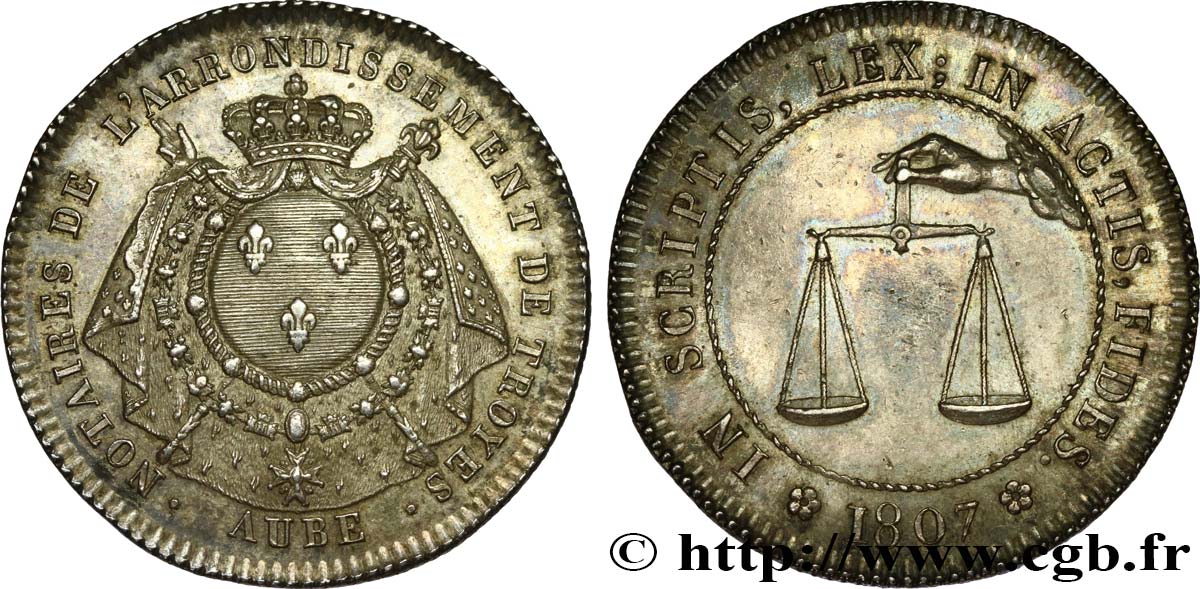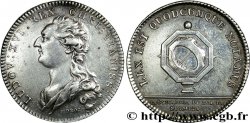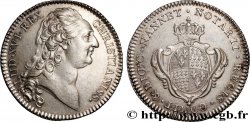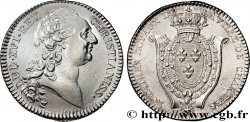Obverse
Obverse legend : NOTAIRES DE L'ARRONDISSEMENT DE TROYES - AUBE.
Obverse description : Armes royales couronnées sur sceptre fleurdelisé et main de justice croisés, entourées des colliers des Ordres et enveloppées du manteau royal.
Reverse
Reverse legend : IN SCRIPTIS, LEX ; IN ACTIS, FIDES. * 1807 *.
Reverse description : Main sortant d'une nuée tenant une balance, dans un cercle torsadé.
Historical background
ROYAL NOTARIES
At the end of the Ancien Régime, the royal notary was a public officer responsible for drafting the deeds to which private parties wanted to confer a character of authenticity.. Only Paris notaries have the privilege of practicing throughout France. A royal provincial notary has jurisdiction only in the jurisdiction of the justice with which he was received (at least 25 years old, and after an investigation into his life and morals). An edict of July 1682 makes it compulsory for everyone to be a Catholic to exercise the notarial office. Notaries are organized into brotherhoods or communities, and enjoy different social prestige depending on the town.. The Parisian notariat is powerful, and benefits from the protection of the Comptroller General of Finance (thus it escapes the formalities of the control of acts). Some officers buy the ennobling office of King's Secretary to complete their social ascent. On the other hand, rural notaries receive little consideration. The notebooks of grievances often mention dishonest and incapable officers! In most cities, however, the notary is a notable, even if his income is modest.. Finally, everywhere, without exception, the notary is the one who holds the pen. He is therefore at the same time clerk, secretary of the communities of inhabitants, steward of noble families, etc.. J. -P. Poisson distinguishes between four main categories of notarial deeds under the Old Regime: 1) deeds relating to credit law (bonds, leases, etc.. ); 2) other economic affairs (sales, exchanges, employment contracts, etc.. ); 3) family law (marriage contracts, donations, wills, partitions, etc.). ); 4) law of the Old Regime and ecclesiastical law (payment of annuities, faith and homage, religious professions, taking possession of cures, etc.. ). Library. : AUBENAS R. , "Study on the Provençal notary in the Middle Ages and under the Ancien Régime", Aix-en-Provence, 1931; GASTON J. , "The community of notaries of Bordeaux, 1520-1791", Bordeaux, 1913; STRING M. -F. , "Notaries at the Châtelet in Paris during the reign of Louis XIV. Institutional and social study", Toulouse, 1992.










 Report a mistake
Report a mistake Print the page
Print the page Share my selection
Share my selection Ask a question
Ask a question Consign / sell
Consign / sell
 Full data
Full data











